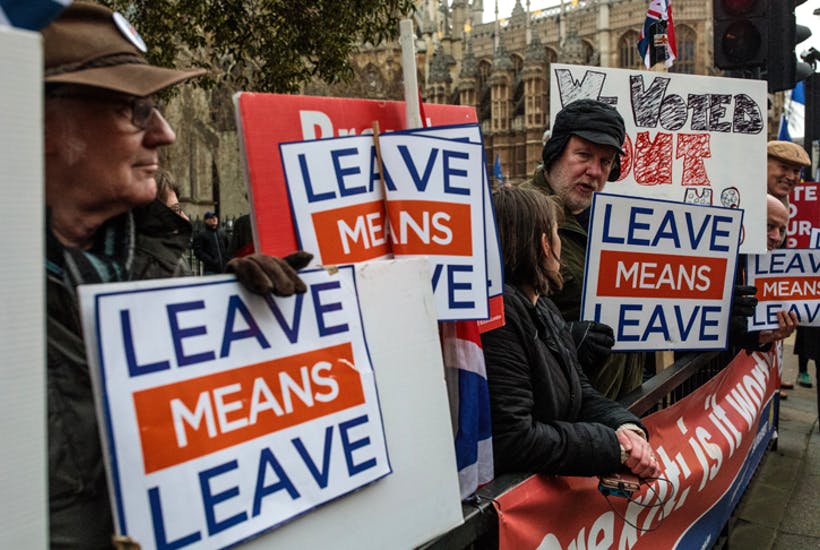My first encounter with a plan to hold not one but two referendums on Britain’s European Union membership happened more than three years ago. At least two individuals were actively entertaining the idea. Both were Leavers. Dominic Cummings had proposed it in one of his blogs. Boris Johnson had not publicly endorsed such a thing, but (I know) was discussing it with interest privately.
The thinking, as I recall, was similar in both cases. The first referendum would be the one we then faced: asking voters for a yes or no to the idea that in principle we should quit. If the result was Remain, we’d remain. If Leave, there would follow two years negotiating a draft withdrawal agreement. Once agreed, the government would present it to the voters and ask in a confirmatory referendum whether they wished to proceed on that basis.
Two justifications for such an approach were doing the rounds among Leavers. The first carried moral force, and was precisely the reason many Remainers now favour the plan: that ‘Remain or Leave’ was an unreasonable question if voters were ignorant of the terms on which we might leave. We were asking them to endorse a pig in a poke. They should therefore be given the chance to approve (or reject) the proposed deal with open eyes, once its outlines were clear.
But there was also a more cynical reason for a possible two-stage Leave. It would be easier to secure a leave-in-principle result if voters could feel assured that this was not the last time they’d be asked. The idea was being explored at a time when Remain were the favourites to win. Making the 2016 plebiscite only provisional would shorten the leap Leave would be asking the electorate to make, render the jump less dangerous, and bring more waverers over.
I ridiculed the idea in the Times, pointing out that this could land our country in a limbo between wanting to leave in principle and rejecting any practical plan for doing so (the very limbo, as it was to turn out, that MPs did land later themselves in).
But I also, like the Leavers, had an ulterior reason for a one-stop referendum. I thought we Remainers would win it outright on the issue of general principle, but might lose if voters were offered a sale-or-return Leave.
The two-stage referendum idea fizzled out among Leavers: indeed it never really took off. They were becoming increasingly confident they could win outright in 2016. Maybe, too, there were the beginnings of an inkling that any draft deal would be a messier business than they were promising — so why saddle themselves with an undertaking to give voters a second bite at the cherry?
In retrospect, they were wise indeed to steer clear. It was all so simple then. But how about now? I am not so much baffled as mildly surprised that, stuck in the bind that now traps them, there has been no revival of interest among the European Research Group in what was an idea despised among them when they were winning, but perhaps of renewed interest now they are losing: the idea of going back to the people for a renewed endorsement of Leave.
They could not of course be confident of (say) no-deal winning such a plebiscite, but why has hope of doing so deserted them so completely? I’d give them a 30 per cent chance of victory. For all its crudity and all the questions it ducks, the slogan ‘We’ve told you once’ has real force. There would undoubtedly be a bulldog spirit of resistance among millions of voters. The polling (and all my anecdotal evidence) is suggesting that ‘Why can’t we just leave and be done with it?’ strikes a huge popular chord. I don’t think it would prevail but I’m by no means sure it wouldn’t. I concede it would be a big risk for Leavers, but what (for serious Brexiteers) are the alternatives?
Revoke? My hunch is that revoke has emerged as a possibility this week. In an emergency, with deadlock between Downing Street and the EU 27, and crash-out looming every closer, I think you could get an easy majority for revoke in the present House of Commons. It may even be that Brussels is consciously or unwittingly kettling us in to that cruel ‘crash-out vs revoke’ corner.
Or maybe Theresa May’s deal and reworked political declaration, with or without a customs union, does finally get through the House. It would come with all kinds of armour-plating against Mrs May’s Tory successors later trying to renege on the Corbyn-friendly bolt-ons, or on the dreaded backstop, which (contrary to the Attorney General’s advice) remains implicit in a customs union. Would this not be the most humiliating way of all for Leavers to lose: vassalage masquerading as Brexit, sullying their great dream?
All that’s now left of that dream is the hope that May never blinks, or blinks too late, and Britain crashes out by mistake. It could happen, but so many forces — a clear majority against no-deal in both Houses, a Speaker prepared to push procedure into realms Erskine May never dreamed of, and an EU ready to go to great lengths to stop no-deal — make that, though not impossible, unlikely.
Finally, there’s the strong chance that we get a year’s extension with no real plan for what we do with it. How do Brexiteers see that ending? With the whole thing going off the boil as we creep towards revoke in 2020?
Or a referendum. Then ‘Bring it on’, I’d say if I were a Brexiteer now. Lead opinion into this fight, front foot; don’t be dragged in, fearful and sulking. Strike while the iron is hot and the Force still with them. Win — and it would be amazing. Lose — and they leave with their pride and their principles intact. Before rejecting an open, clean, democratic fight, willingly embraced, Leavers should weigh the alternatives now left to them.







Comments